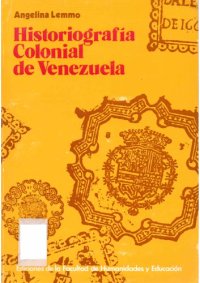
Ebook: Historiografía colonial de Venezuela
Author: Angelina Lemmo
- Tags: History, historiography, colonial history, chronicles, natural historians, travellers, explorers, missionaries, Gilij, Gumilla, Alexander von Humboldt, Depons, Venezuela, Orinoco, Andes, America, Spanish conquest, descriptions, West Indies, colonies, geography, 1556-1810
- Series: Varia 16
- Year: 1977
- Publisher: Facultad de Humanidades y Educación
- City: Caracas
- Language: Spanish
- pdf
Originally presented as the author's thesis (Ph. D.)--Universidad Central de Venezuela, 1975, under the title: Estudios de historiografía colonial de Venezuela.
Venezuela has a long and rich tradition of historiographical studies. It is within this tradition that the complex and detailed work by Angelina Lemmo takes its referents. Covering the travelers, chroniclers, and naturalists of primary importance for the history of Venezuela written between the discovery and the independence era, Professor Lemmo’s book is a kaleidoscopic analysis of Venezuelan historians and their critiques, uses, and misuses of that country’s colonial historiography. Because of Lemmo’s extraordinary command of the bibliography and historiography at issue, this book provides a unique view of the complex interrelationship between historian, chronicler, and sources. Her perspective is clearly defined and she defends it with verve and determination.
As part of the new generation of Venezuelan historians whose critical and analytical skills have been devoted to the reevaluation of the country’s past and with an iconoclastic contempt for the failings and missteps of less able or less perceptive predecessors, Dr. Lemmo has dissected the classic works of Venezuelan colonial historiography. Assigning credits for originality and accuracy and demerits for copying, misrepresentation, and fabrications, she categorizes the likes of Fray Pedro de Aguado and Nicolás Federman, Fray Pedro Simón and Fray Matías Ruiz Blanco, José de Oviedo y Baños, and Padre José Gumilia and Padre Ramón Bueno. In each category, principally determined by chronological limits, Dr. Lemmo examines not only the classic work itself but also its uses, comments about it, and evaluations by later historians. Because of the incestuous nature of much of Venezuela’s historiography, this becomes a very complex analysis of interrelationships, multiple attributions, third-hand copying, and the like. But for those with the interest and fortitude to last through the 400 pages of analysis, quotations, citations, and elaborate notes, the benefit to be gained is great.
Venezuela has a long and rich tradition of historiographical studies. It is within this tradition that the complex and detailed work by Angelina Lemmo takes its referents. Covering the travelers, chroniclers, and naturalists of primary importance for the history of Venezuela written between the discovery and the independence era, Professor Lemmo’s book is a kaleidoscopic analysis of Venezuelan historians and their critiques, uses, and misuses of that country’s colonial historiography. Because of Lemmo’s extraordinary command of the bibliography and historiography at issue, this book provides a unique view of the complex interrelationship between historian, chronicler, and sources. Her perspective is clearly defined and she defends it with verve and determination.
As part of the new generation of Venezuelan historians whose critical and analytical skills have been devoted to the reevaluation of the country’s past and with an iconoclastic contempt for the failings and missteps of less able or less perceptive predecessors, Dr. Lemmo has dissected the classic works of Venezuelan colonial historiography. Assigning credits for originality and accuracy and demerits for copying, misrepresentation, and fabrications, she categorizes the likes of Fray Pedro de Aguado and Nicolás Federman, Fray Pedro Simón and Fray Matías Ruiz Blanco, José de Oviedo y Baños, and Padre José Gumilia and Padre Ramón Bueno. In each category, principally determined by chronological limits, Dr. Lemmo examines not only the classic work itself but also its uses, comments about it, and evaluations by later historians. Because of the incestuous nature of much of Venezuela’s historiography, this becomes a very complex analysis of interrelationships, multiple attributions, third-hand copying, and the like. But for those with the interest and fortitude to last through the 400 pages of analysis, quotations, citations, and elaborate notes, the benefit to be gained is great.
Download the book Historiografía colonial de Venezuela for free or read online
Continue reading on any device:

Last viewed books
Related books
{related-news}
Comments (0)